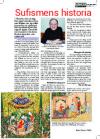Sufismens historia

| Upphovsperson: | Persson, Henrik |
|---|---|
| Utgivare: | Fjärde Världen |
| Tidskrift/källa: | Fjärde Världen |
| År: | 2016 |
| Ämnesord: | Poesi, Poeter, Sufism, Islam, Kultur |

| Upphovsperson: | Persson, Henrik |
|---|---|
| Utgivare: | Fjärde Världen |
| Tidskrift/källa: | Fjärde Världen |
| År: | 2016 |
| Ämnesord: | Poesi, Poeter, Sufism, Islam, Kultur |
| Upphovsperson: | Evers Rosander, Eva |
|---|---|
| Utgivare: | Nordiska Afrikainstitutet | Nordiska Afrikainstitutet; Carlssons förlag |
| År: | 2011 |
| Ämnesord: | Religion, Islam, Sufism, Kvinnor, Senegalesiskor, Senegal, Familjer, Levnadsförhållanden, Ekonomiska förhållanden, Sociala förhållanden, diaspora, Immigranter, Teneriffa, SOCIAL SCIENCES, SAMHÄLLSVETENSKAP |
| Upphovsperson: | Weiss, Holger |
|---|---|
| Utgivare: | Nordiska Afrikainstitutet | Uppsala : Nordiska Afrikainstitutet |
| År: | 2002 |
| Ämnesord: | economics, Educations, Islamic Countries, Religion, Social welfare, Sufism, Ghana, Morocco, Nigeria, Senegal, Sudan, SOCIAL SCIENCES, SAMHÄLLSVETENSKAP |